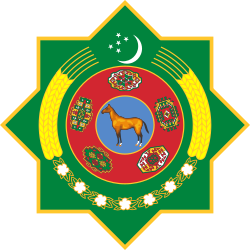 |
|---|
The visa policy of Turkmenistan is among the most restrictive of any country in the world. Citizens of all countries (except Uzbekistan in certain cases) require a visa to enter Turkmenistan unless they have special passports. To obtain a tourist visa for Turkmenistan, all foreign citizens must supply an invitation letter issued by a travel agency licensed in Turkmenistan. [1] Holders of a letter of invitation issued by a company registered in Turkmenistan with a prior approval from the Ministry of Foreign Affairs may obtain a visa on arrival valid for 10 days, and extendable for another 10 days. [2]
Contents
- Visa exemption
- Non-ordinary passports
- Special permit
- Admission restrictions
- Visitor statistics
- Citizens of the Russian Federation
- Transit
- See also
- References
- Links
There are plans to introduce electronic visas and abolish the requirement of a letter of invitiation. With the goal of allowing smoother business visits and boosting foreign tourism, President Serdar Berdimuhamedow signed a decree on 18 April 2025 that will introduce these changes. The types of electronic visas that will be available, how they will be issued, and how long they will be valid for have yet to be decided. [3] [4] [5]

